A delicious soapy and trashy melodrama about a bad-girl model who’ll sleep with any man that strikes her fancy, Butterfield 8 has ‘guilty pleasure’ scrawled across it in bright pink lipstick. It tells the story of a model/good-time girl Gloria, the married man she has an affair with, and her journey from damaged goods to trying to be a morally responsible person. True love as redemption, story old as time. But Gloria is a bit more interesting when she’s a bad girl; the actress’ personal life reflects itself better in that part of the role.
While she claims to loathe and detest the film, and only made it to complete her MGM contract so she could accept a million dollar payday for Cleopatra, Elizabeth Taylor delivers a perfectly fine performance. Not quite as subdued and minimalist as her knockout turns in Cat on a Hot Tin Roof or A Place in the Sun, BUtterfield 8 still sees her using every gift she possessed as an actress. In fact, her hungover and disturbingly mundane walk-of-shame throughout the latest (married) conquest's apartment is a fantastic piece of acting. She goes into auto-pilot and pours herself another drink, lingers around in every room investigating for signs of…who knows what exactly, and finds $250 on the mantelpiece with a note asking if that was enough for her services. Her freakout, she isn’t really a hooker but more of an easy lay and disturbed little-girl-lost, is wonderfully played. That is when she writes “No Sale” on the mirror in lipstick. It isn’t just her mannerism and vocals, but the way that she can hold her body. She knew how to tell a story with her body. The only thing that underscores her performance is the invasive and ponderous score. She is given decent support from everyone but Eddie Fisher, who was a singer and not an actor. Fisher isn’t just swallowed up by her talents and screen power, he’s a cardboard cutout next to her fleshy pagan sex goddess.
Butterfield 8 might not be a classic in Taylor’s filmography, but there’s something incredibly fun and enjoyable about it, trashy faults and all. It’s often predictable, sometimes a little silly, but Taylor gives a committed and wonderful performance. She still won this particular Oscar for surviving a near-death experience and being nominated the four previous years in a row. A nomination for this role, sure, why not? I would have given her one. But she went on to win for artistic merit for Who’s Afraid of Virginia Woolf? a few years later. BUtterfield 8 is pure, unadulterated guilty pleasure and I have no problem admitting to this fact. I enjoy it greatly.
BUtterfield 8
 Posted : 14 years, 9 months ago on 20 September 2010 08:18
(A review of Butterfield 8)
Posted : 14 years, 9 months ago on 20 September 2010 08:18
(A review of Butterfield 8) 0 comments, Reply to this entry
0 comments, Reply to this entry
A Place in the Sun
 Posted : 14 years, 9 months ago on 20 September 2010 08:18
(A review of A Place in the Sun)
Posted : 14 years, 9 months ago on 20 September 2010 08:18
(A review of A Place in the Sun)Shot in 1949 but not released until 1951, A Place in the Sun was well worth the wait. When filming wrapped it would have competed against Sunset Blvd. and All About Eve for the Academy Awards glory, but in 1951 it competed against A Streetcar Named Desire and An American in Paris, oh what glorious years. This is actually the second adaptation of Theodore Dreiser’s novel An American Tragedy, but after the first one bombed a new name was sought out to ensure box office appeal. It worked.
A Place in the Sun tells the story of young man who meets a woman and falls in love, he then meets the love of his life, can’t shake the baggage and promises he made to the first woman. Clift is the outside man to a rich and affluent family in a small-town. His mother, an underused by strong Anne Revere, has forsaken her family’s riches for a life of poverty and charitable work. He has been raised with awareness to the plight of the poor and a heavy-handed testament towards religion. Shelley Winters is a part of his working class world. She is a worker in the factory that his uncle owns, they flirt and enjoy each other’s company. Elizabeth Taylor, always buzzing about as the party-ready rich-girl, is a glimpse into another world. Taylor’s extreme, almost painful beauty is enough to make anyone dump their partner and run off with her. He’s only human. But what to do about Winters? Especially once she returns demanding that he marries her since she is now pregnant with his child. What follows is harrowing.
Our sympathies and understandings are with each of these characters. That is thanks to the sublime performances from three of the screen’s most gifted actors. Montgomery Clift was an early variation of the ‘Method’ acting style. There was always something waifish, slightly effete about him. He uses that bruised and softened masculinity to great effect here. With his eyes capable of expressing so much, he didn’t need to rely on a lot of bodily pyrotechnics to sell the performance. His face could tell it all. That was a trick that he taught to Elizabeth Taylor. At only 18, she nails her first adult role. Their romantic scenes together are an intricate mating dance, each trying to entice the other more and more. It culminates in an erotically charged kiss.
But the real secret weapon is Shelley Winters, who forsakes her glamorous sex goddess image for a frumpy and dowdy role. It was a smart move on her part. Winters is one of the few actresses who could boast about a career boost after gaining weight and ceasing her blonde bombshell persona. Just look at the roles to come: Lolita, The Diary of Anne Frank, A Patch of Blue and her beloved turn in The Poseidon Adventure. She was a great actress who sometimes couldn’t pick a good part if it fell into her lap, but here is where she got her first notices. It’s still a great performance.
It has been said that Clift and director George Stevens argued bitterly about the ending of the film. Stevens wanted the film to end with Clift crying and in hysterics. Clift believed that any man in his character's situation would have been too dead emotionally to register anything on his face. The right person won. His face at the end is as great a final image as the ones in, say, Bonnie & Clyde, Queen Christina or The Godfather. His visage, pained and hypnotic, screams out “Fate, thou art a cruel mistress.”
A Place in the Sun tells the story of young man who meets a woman and falls in love, he then meets the love of his life, can’t shake the baggage and promises he made to the first woman. Clift is the outside man to a rich and affluent family in a small-town. His mother, an underused by strong Anne Revere, has forsaken her family’s riches for a life of poverty and charitable work. He has been raised with awareness to the plight of the poor and a heavy-handed testament towards religion. Shelley Winters is a part of his working class world. She is a worker in the factory that his uncle owns, they flirt and enjoy each other’s company. Elizabeth Taylor, always buzzing about as the party-ready rich-girl, is a glimpse into another world. Taylor’s extreme, almost painful beauty is enough to make anyone dump their partner and run off with her. He’s only human. But what to do about Winters? Especially once she returns demanding that he marries her since she is now pregnant with his child. What follows is harrowing.
Our sympathies and understandings are with each of these characters. That is thanks to the sublime performances from three of the screen’s most gifted actors. Montgomery Clift was an early variation of the ‘Method’ acting style. There was always something waifish, slightly effete about him. He uses that bruised and softened masculinity to great effect here. With his eyes capable of expressing so much, he didn’t need to rely on a lot of bodily pyrotechnics to sell the performance. His face could tell it all. That was a trick that he taught to Elizabeth Taylor. At only 18, she nails her first adult role. Their romantic scenes together are an intricate mating dance, each trying to entice the other more and more. It culminates in an erotically charged kiss.
But the real secret weapon is Shelley Winters, who forsakes her glamorous sex goddess image for a frumpy and dowdy role. It was a smart move on her part. Winters is one of the few actresses who could boast about a career boost after gaining weight and ceasing her blonde bombshell persona. Just look at the roles to come: Lolita, The Diary of Anne Frank, A Patch of Blue and her beloved turn in The Poseidon Adventure. She was a great actress who sometimes couldn’t pick a good part if it fell into her lap, but here is where she got her first notices. It’s still a great performance.
It has been said that Clift and director George Stevens argued bitterly about the ending of the film. Stevens wanted the film to end with Clift crying and in hysterics. Clift believed that any man in his character's situation would have been too dead emotionally to register anything on his face. The right person won. His face at the end is as great a final image as the ones in, say, Bonnie & Clyde, Queen Christina or The Godfather. His visage, pained and hypnotic, screams out “Fate, thou art a cruel mistress.”
 0 comments, Reply to this entry
0 comments, Reply to this entry
Now, Voyager
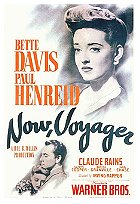 Posted : 14 years, 9 months ago on 20 September 2010 08:17
(A review of Now, Voyager)
Posted : 14 years, 9 months ago on 20 September 2010 08:17
(A review of Now, Voyager)Really three films in one, Now, Voyager is an absolutely intoxicating experience. One part breathless romance, one part character transformation and one part kindred-spirit-soothes-all-wounds weepie, this is the Warner Brother’s melodrama to end them all. A towering acting achievement in Bette Davis’ illustrious crown in which she changes from dowdy and neurotic to glamorous and confident socialite. It’s also one hell of a move, a fine example of the phrase “They don’t make ‘em like they used to.”
Now, Voyager sees Charlotte Vale start life with her elderly domineering shrew of a mother (Gladys Cooper). Because of her mother’s manipulations and constant put-downs, Charlotte is half a person. Davis obviously relishes this section of the film – she’s padded out in a fat suit, crackling with intense neurosis and a unibrow for the ages. She never overdoes it, but that gleam in her eye is obvious to anyone who can spot it. Inset Claude Raines, one of the two men who could have stood before Davis and not get swallowed whole, as the kindly psychiatrist. He gives her the tools and the softness needed for her transformation to take effect. And so closes Act I.
Act II begins on a pleasure cruise that Vale takes in order to try out her new personality and outlook on life. She must meet-and-greet and come out of her shell. She must be confident and glamorous. Here she meets Paul Henreid, the other man who could go toe-to-toe with Davis and not lose, and begins a complicated romance for the ages. Armed with a fledging self-worth and a lot of smarts, Vale tries out her newly acquired people skills on Henreid’s Jerry, a debonair man with baggage in the form of a ball-busting wife and two daughters, who seems receptive to her charms and ashamed by the very same fact. Their romance is destined to trials and tribulations, doomed to an eternity of staring at each other from across the room and never being able to embrace. And in an ingenious bit of improvisation on Henreid’s part, Jerry lights two cigarettes and hands one to Vale. This reoccurs numerous times, and each time it’s the closet the two of them can come to making love, kissing, touching, being together.
Act III sees Vale becoming a surrogate mother to Jerry’s youngest daughter – a younger doppelganger for Vale’s character and an act that allows for her to project and act out the wants and needs she has with Jerry. She all but adopts the poor thing in a passive aggressive way to keep Jerry in her life. But she does it out of genuine concern and love for the distraught girl mainly, and for the love of Jerry secondly. She has already bonded and adored the girl long before she discovers who her parents really are. And it all climaxes in a scene, in a line so poetically beautiful and heartbreakingly romantic that can, and should, be used as an example of the kind of magic and power that only movies can generate in us.
But how do these three separate strands connect and intertwine more cleanly? I will not tell you. That is for you to discover. It’s a wonderful journey, made all the more wonderful by each of the performances. Davis forsakes her usual twitches and tics, her normally bitchy demeanor and relish in darkness on the outskirts of a role. Instead, she remains strong and steadfast throughout, but she is softer and gentler here. Not since Dark Victory had she played a character so likable and audience-rousing. We want her to find true love, to escape with Henreid and take his youngest daughter with them. It is a remarkable performance that garnered her sixth Academy Award nomination. Also recognized by the Academy that year was Gladys Cooper as her domineering, demanding and abusive mother. It’s a harpy of a character and Cooper nails it. Raines is a nice balm for all scars, and truly Davis’ greatest frequent co-star. He knew that she was the star and to get out of her way. He also knew that a smaller supporting performance could go a long way. Henreid is as perfect as her right Mr. Right that not much more can be said. One can forgive him for being slightly stiff in Casablanca.
Now, Voyager is a melodrama to its very core, but one so intoxicating in its presentation and atmosphere that you can’t help but get swept up in it all. Davis steers the film and gives one of her greatest performances, but everything is so meticulous and finely performed that it’s a real treat for even the smallest of performances. A valentine of a film with a fantastic parting line, and, no, I won’t repeat it for you.
Now, Voyager sees Charlotte Vale start life with her elderly domineering shrew of a mother (Gladys Cooper). Because of her mother’s manipulations and constant put-downs, Charlotte is half a person. Davis obviously relishes this section of the film – she’s padded out in a fat suit, crackling with intense neurosis and a unibrow for the ages. She never overdoes it, but that gleam in her eye is obvious to anyone who can spot it. Inset Claude Raines, one of the two men who could have stood before Davis and not get swallowed whole, as the kindly psychiatrist. He gives her the tools and the softness needed for her transformation to take effect. And so closes Act I.
Act II begins on a pleasure cruise that Vale takes in order to try out her new personality and outlook on life. She must meet-and-greet and come out of her shell. She must be confident and glamorous. Here she meets Paul Henreid, the other man who could go toe-to-toe with Davis and not lose, and begins a complicated romance for the ages. Armed with a fledging self-worth and a lot of smarts, Vale tries out her newly acquired people skills on Henreid’s Jerry, a debonair man with baggage in the form of a ball-busting wife and two daughters, who seems receptive to her charms and ashamed by the very same fact. Their romance is destined to trials and tribulations, doomed to an eternity of staring at each other from across the room and never being able to embrace. And in an ingenious bit of improvisation on Henreid’s part, Jerry lights two cigarettes and hands one to Vale. This reoccurs numerous times, and each time it’s the closet the two of them can come to making love, kissing, touching, being together.
Act III sees Vale becoming a surrogate mother to Jerry’s youngest daughter – a younger doppelganger for Vale’s character and an act that allows for her to project and act out the wants and needs she has with Jerry. She all but adopts the poor thing in a passive aggressive way to keep Jerry in her life. But she does it out of genuine concern and love for the distraught girl mainly, and for the love of Jerry secondly. She has already bonded and adored the girl long before she discovers who her parents really are. And it all climaxes in a scene, in a line so poetically beautiful and heartbreakingly romantic that can, and should, be used as an example of the kind of magic and power that only movies can generate in us.
But how do these three separate strands connect and intertwine more cleanly? I will not tell you. That is for you to discover. It’s a wonderful journey, made all the more wonderful by each of the performances. Davis forsakes her usual twitches and tics, her normally bitchy demeanor and relish in darkness on the outskirts of a role. Instead, she remains strong and steadfast throughout, but she is softer and gentler here. Not since Dark Victory had she played a character so likable and audience-rousing. We want her to find true love, to escape with Henreid and take his youngest daughter with them. It is a remarkable performance that garnered her sixth Academy Award nomination. Also recognized by the Academy that year was Gladys Cooper as her domineering, demanding and abusive mother. It’s a harpy of a character and Cooper nails it. Raines is a nice balm for all scars, and truly Davis’ greatest frequent co-star. He knew that she was the star and to get out of her way. He also knew that a smaller supporting performance could go a long way. Henreid is as perfect as her right Mr. Right that not much more can be said. One can forgive him for being slightly stiff in Casablanca.
Now, Voyager is a melodrama to its very core, but one so intoxicating in its presentation and atmosphere that you can’t help but get swept up in it all. Davis steers the film and gives one of her greatest performances, but everything is so meticulous and finely performed that it’s a real treat for even the smallest of performances. A valentine of a film with a fantastic parting line, and, no, I won’t repeat it for you.
 0 comments, Reply to this entry
0 comments, Reply to this entry
Jezebel
 Posted : 14 years, 9 months ago on 20 September 2010 08:17
(A review of Jezebel)
Posted : 14 years, 9 months ago on 20 September 2010 08:17
(A review of Jezebel)Often considered something of a consolation prize for losing out on Gone With the Wind, Jezebel actually has its own merits and charms. Chief among them is the central performance by Bette Davis in which she gets to be both wild and meek. The film is often talked about in the same breath as that Hollywood epic, but it’s an entirely different beast. The similarities are only superficial, really.
Jezebel tells the story of Julie, a headstrong but easily broken southern belle during the Antebellum period. Her selfish choices and too-late actions cause her to lose her life-long love, Preston Dillard (Henry Fonda), to a Yankee. And it all ends with an outbreak of yellow fever. Equal parts romantic melodrama and period piece costume pageantry, Jezebel is an elegant production with confident direction from William Wyler. He crafts textures and moods with his sets and cinematography that enrich the emotional resonance of the film. The ballroom scene where Julie and Preston are shown to have caused a riot of polite passive-aggressive bitchery is absolutely fantastic. Julie has worn a red dress, hoping to cause a stir and a mild controversy, and once she realizes that she’s caused a major tremor in her society she wants to back away. To hide at her family home, bury herself within it and only return when the rest of the community has decided her white flag of peace has been waving for long enough. Preston will not allow for this, he forcefully moves her onto the dancefloor and threateningly stares down anyone who would argue otherwise with him. Not one word is said, but the way he manipulates the camera’s movements and the performances that he gets from the actors tells the entire story. Much like The Age of Innocence, this is a world where the greatest sin is not in committing the offense, but in your boastful arrogance in trying to subvert it. You will pay for the sin in thought and deed.
Davis masterfully charts the transformation of a willful and manipulative princess type into a person of soul, conscious and thoughts for others. She might have shamed Preston into breaking up their engagement, humiliated him into marrying another woman, but she will not let him go just yet. Until she realizes that her penance with him will get her no where. Scarlett O’Hara she is not, but she’s cut from a more docile cloth. The scene where she encourages and leads the slaves in a song is desperate cry for help and a wonderfully subtle way to say that she is losing grip on her emotions. She deserved that Oscar.
Jezebel tells the story of Julie, a headstrong but easily broken southern belle during the Antebellum period. Her selfish choices and too-late actions cause her to lose her life-long love, Preston Dillard (Henry Fonda), to a Yankee. And it all ends with an outbreak of yellow fever. Equal parts romantic melodrama and period piece costume pageantry, Jezebel is an elegant production with confident direction from William Wyler. He crafts textures and moods with his sets and cinematography that enrich the emotional resonance of the film. The ballroom scene where Julie and Preston are shown to have caused a riot of polite passive-aggressive bitchery is absolutely fantastic. Julie has worn a red dress, hoping to cause a stir and a mild controversy, and once she realizes that she’s caused a major tremor in her society she wants to back away. To hide at her family home, bury herself within it and only return when the rest of the community has decided her white flag of peace has been waving for long enough. Preston will not allow for this, he forcefully moves her onto the dancefloor and threateningly stares down anyone who would argue otherwise with him. Not one word is said, but the way he manipulates the camera’s movements and the performances that he gets from the actors tells the entire story. Much like The Age of Innocence, this is a world where the greatest sin is not in committing the offense, but in your boastful arrogance in trying to subvert it. You will pay for the sin in thought and deed.
Davis masterfully charts the transformation of a willful and manipulative princess type into a person of soul, conscious and thoughts for others. She might have shamed Preston into breaking up their engagement, humiliated him into marrying another woman, but she will not let him go just yet. Until she realizes that her penance with him will get her no where. Scarlett O’Hara she is not, but she’s cut from a more docile cloth. The scene where she encourages and leads the slaves in a song is desperate cry for help and a wonderfully subtle way to say that she is losing grip on her emotions. She deserved that Oscar.
 0 comments, Reply to this entry
0 comments, Reply to this entry
Man of La Mancha
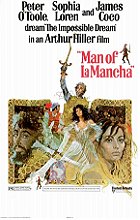 Posted : 14 years, 9 months ago on 13 September 2010 12:33
(A review of Man of La Mancha)
Posted : 14 years, 9 months ago on 13 September 2010 12:33
(A review of Man of La Mancha)I firmly believe that Arthur Hiller could be a good director when he rustled up the courage and ingenuity to do so. The Americanization of Emily features a dark and complicated performance from Julie Andrews and is an impressive film. But he also threw out Love Story, a sappy Lifetime movie-of-the-week before such a thing existed. That is just to name two of his films. So where does that leave Man of La Mancha? Well, it’s a bad film with a few good moments.
Insufferably long and armed with uninspired and groan-worthy songbook to go along with it, Man of La Mancha is confusing and cheap-looking. Told in flashbacks and fantasy sequences, which you eventually learn but improbably difficult to figure out for the first oh half hour, it takes place mostly in a dungeon. A dungeon which is poorly lit and dingy, at best, and only furthers the question as to where this film’s budget went to.
Peter O’Toole, a fantastic dramatic actor, is an awful musical star. Some actors could do the musical route and straight acting (Judy Garland), some are best at straight acting but can manage in a musical (Penelope Cruz), and some are just absolutely atrocious as song-and-dance performers, like O’Toole. He’s visibly drunk and it effects his performance throughout the film – yes, even the straight dramatic parts. Sophia Loren, again cast as a hooker with a heart of gold, can sort of sing, but she mostly is capable of projecting the warmth, concern and motherly affection needed from this role. The rest of the supporting cast is neither awful nor good, just there to get their payday and move on.
But what can be said about a musical adaptation of a novel which presented Don Quixote as figure of satirical intent and changes that to a straightforward, literal-minded examination of Quixote-as-hero, daring to face the impossible dream? Well, that they missed the point is obvious. But even better: “The Impossible Dream” is the kind of bombastic schmaltz that taints the image of musical theater in the minds of many.
Insufferably long and armed with uninspired and groan-worthy songbook to go along with it, Man of La Mancha is confusing and cheap-looking. Told in flashbacks and fantasy sequences, which you eventually learn but improbably difficult to figure out for the first oh half hour, it takes place mostly in a dungeon. A dungeon which is poorly lit and dingy, at best, and only furthers the question as to where this film’s budget went to.
Peter O’Toole, a fantastic dramatic actor, is an awful musical star. Some actors could do the musical route and straight acting (Judy Garland), some are best at straight acting but can manage in a musical (Penelope Cruz), and some are just absolutely atrocious as song-and-dance performers, like O’Toole. He’s visibly drunk and it effects his performance throughout the film – yes, even the straight dramatic parts. Sophia Loren, again cast as a hooker with a heart of gold, can sort of sing, but she mostly is capable of projecting the warmth, concern and motherly affection needed from this role. The rest of the supporting cast is neither awful nor good, just there to get their payday and move on.
But what can be said about a musical adaptation of a novel which presented Don Quixote as figure of satirical intent and changes that to a straightforward, literal-minded examination of Quixote-as-hero, daring to face the impossible dream? Well, that they missed the point is obvious. But even better: “The Impossible Dream” is the kind of bombastic schmaltz that taints the image of musical theater in the minds of many.
 0 comments, Reply to this entry
0 comments, Reply to this entry
That Kind of Woman
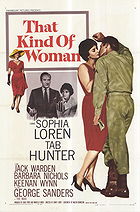 Posted : 14 years, 9 months ago on 13 September 2010 12:33
(A review of That Kind of Woman)
Posted : 14 years, 9 months ago on 13 September 2010 12:33
(A review of That Kind of Woman)Throughout That Kind of Woman Sophia Loren demonstrates the mystical allure that is “star power” and provides the only true point of interest for the audience. The script is a middling soap opera about a kept woman who seems perfectly content until she meets a pin-up boy GI and decides to throw everything away for him and “true love.” Tab Hunter, a delicious piece of adornment, generates no real chemistry or sparks with Loren. There romance is more of a polite and agreeable friendship than the passionate searing that comes along with a life altering love affair. George Sanders, wonderfully droll as ever, is the man who is footing the bill for Loren’s life of luxury. And Loren, who could give an erotic charge to anything mundane, radiates the kind of star power charisma that is sorely lacking in today’s cinema. She was a movie star who could act, but was mostly given that challenge in her wonderful films with Marcello Mastroianni and Vittorio Di Sica. That Kind of Woman isn’t awful, but painfully artificial and devoid of any real chemistry or depth in the central relationship. It is mildly daring for a film to acknowledge the concept of a “kept” woman and sex as something possibly devoid of love in the 50s.
 0 comments, Reply to this entry
0 comments, Reply to this entry
Caesar and Cleopatra
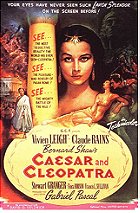 Posted : 14 years, 9 months ago on 12 September 2010 09:25
(A review of Caesar and Cleopatra)
Posted : 14 years, 9 months ago on 12 September 2010 09:25
(A review of Caesar and Cleopatra)Caesar and Cleopatra is a strong case study of a lavish production with a sluggish and fitfully dull outcome. The main problem, which is obvious to anyone viewing the film, is that the entire spectacle causes the viewer to be removed from the characters and their societal drama. Both of these things are far more interesting than the spectacle. Why? George Bernard Shaw, the British playwright armed with a whip-smart acerbic wit, is known for writing richly detailed characters and smartly observant dialogue. Here those words are working against a film that is visually elephantine and plodding. It’s purely stage bound and never allows the film to breathe the way it should despite being so ornately detailed. But it’s not for a lack of trying to give the material life from the lead actors that the film fails. Claude Rains and Vivien Leigh give their typically solid work here. Rains is, as always, withering and deeply cynical as Caesar. His work is so good that I expected to look it up and find an Oscar nomination for Best Actor for his work in this film; I only found a nomination for John Bryan’s art direction. And Leigh’s performance as Cleopatra starts out as a kittenish youth and ends with her as a sexually confident and mature empress. Her alabaster skin, dark hair and exotic costuming and makeup help to mark the transition, but it’s her sheer dedication and willpower as an actress that makes the performance so commanding. They both deserved a better film.
 0 comments, Reply to this entry
0 comments, Reply to this entry
The Exorcism of Emily Rose
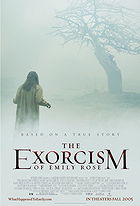 Posted : 14 years, 9 months ago on 12 September 2010 07:16
(A review of The Exorcism of Emily Rose)
Posted : 14 years, 9 months ago on 12 September 2010 07:16
(A review of The Exorcism of Emily Rose)The Exorcism of Emily Rose was a heartbreaking ordeal for me. Why? Because the project had POTENTIAL written in large black ink all over it, but what happened? I'm still not sure. The ideas are there, the cast is there and the cinematography is there too. I'm just not sure where it went off into eye-rolling, laughably bad territory. I blame the script which saddles characters with the clunky and cringe-inducing bits of dialogue.
Laura Linney tries to anchor this unwieldy mess as much as she can with a reliable strong acting performance that is full of acting with a little a. It's a pity that her character's trajectory is so painfully clichéd and trite that it only furthers the eye-rolling. She’s a woman who’s fallen away from spirituality and wholesome values and into the perilous existence of being a single career woman. Excuse while I snort with laughter and disgust. Tom Wilkinson tries his best with what is being given to him, but even his immense talents can’t rise above this material. Jennifer Carpenter as Emily Rose contorts and twists her body into poses that look more like yoga than demonic possession. Her performance made me think that she was a young woman with religious zeal but severe schizophrenia, or some similar mental illness. She thrust herself gamely into the performance, but, again, is given laughably bad dialogue to say. What demon would say “Trick or treat, I give you tricks: One, two, three, four, five, six!”? And, when the ‘big reveal’ tells us that, yes, she is ‘possessed’ by six demons and one of them is the devil, instead of altering her voice into something disturbing they left it alone. The effect is that of a kitten mewing at you and expecting terror when it should have been like coming to face to face with a hungry lion. Shohreh Aghdashloo, always reliable for a strong supporting performance, is utterly wasted in a glorified cameo.
The Big Idea behind it all is unknowable, which isn’t a real issue, but what is the real issue? It purports to be the true story of Emily Rose, but a quick search with Wikipedia will tell you that is pure tripe. Science and medicine or theology and religious mysticism, which is it? You can only believe in one. It’s the argument that you can only believe in one that truly angers and upsets me. Personally, I have no real religious beliefs, nor do I want any, but I believe that there is a middle ground to be had. This film argues that no middle ground can exist.
It isn’t just the way that script egregiously makes its arguments, but the dialogue that it uses to make those arguments that upsets me so. What priest would say “The game is on!” twice? Once during the exorcism, seen only in pieces during extended flashbacks since this film is actually a courtroom drama, and once during the trial with each utterance leading to a combination of stifled laughter and cringe from me as I watched. And in a film that is trying to make me think and feel some kind of frightened and nervous tension unintentional laughter is the last thing that they wanted. Well, what do you expect with such a fourth-rate script?
[What ever became of the real Emily Rose? Well, for starters, she suffered from epileptic seizures long before claiming demonic possession, suffered from severe bouts of depression, hallucinations and heard voices. She claimed she was demonically possessed for over a year, received over seventy exorcisms and died of dehydration and malnutrition. The priests and her parents were found guilty of manslaughter, and the court found that she was epileptic and not demonically possessed. I agree with the court.]
Laura Linney tries to anchor this unwieldy mess as much as she can with a reliable strong acting performance that is full of acting with a little a. It's a pity that her character's trajectory is so painfully clichéd and trite that it only furthers the eye-rolling. She’s a woman who’s fallen away from spirituality and wholesome values and into the perilous existence of being a single career woman. Excuse while I snort with laughter and disgust. Tom Wilkinson tries his best with what is being given to him, but even his immense talents can’t rise above this material. Jennifer Carpenter as Emily Rose contorts and twists her body into poses that look more like yoga than demonic possession. Her performance made me think that she was a young woman with religious zeal but severe schizophrenia, or some similar mental illness. She thrust herself gamely into the performance, but, again, is given laughably bad dialogue to say. What demon would say “Trick or treat, I give you tricks: One, two, three, four, five, six!”? And, when the ‘big reveal’ tells us that, yes, she is ‘possessed’ by six demons and one of them is the devil, instead of altering her voice into something disturbing they left it alone. The effect is that of a kitten mewing at you and expecting terror when it should have been like coming to face to face with a hungry lion. Shohreh Aghdashloo, always reliable for a strong supporting performance, is utterly wasted in a glorified cameo.
The Big Idea behind it all is unknowable, which isn’t a real issue, but what is the real issue? It purports to be the true story of Emily Rose, but a quick search with Wikipedia will tell you that is pure tripe. Science and medicine or theology and religious mysticism, which is it? You can only believe in one. It’s the argument that you can only believe in one that truly angers and upsets me. Personally, I have no real religious beliefs, nor do I want any, but I believe that there is a middle ground to be had. This film argues that no middle ground can exist.
It isn’t just the way that script egregiously makes its arguments, but the dialogue that it uses to make those arguments that upsets me so. What priest would say “The game is on!” twice? Once during the exorcism, seen only in pieces during extended flashbacks since this film is actually a courtroom drama, and once during the trial with each utterance leading to a combination of stifled laughter and cringe from me as I watched. And in a film that is trying to make me think and feel some kind of frightened and nervous tension unintentional laughter is the last thing that they wanted. Well, what do you expect with such a fourth-rate script?
[What ever became of the real Emily Rose? Well, for starters, she suffered from epileptic seizures long before claiming demonic possession, suffered from severe bouts of depression, hallucinations and heard voices. She claimed she was demonically possessed for over a year, received over seventy exorcisms and died of dehydration and malnutrition. The priests and her parents were found guilty of manslaughter, and the court found that she was epileptic and not demonically possessed. I agree with the court.]
 0 comments, Reply to this entry
0 comments, Reply to this entry
Van Helsing
 Posted : 14 years, 9 months ago on 12 September 2010 06:26
(A review of Van Helsing)
Posted : 14 years, 9 months ago on 12 September 2010 06:26
(A review of Van Helsing)To say that Van Helsing is an over-bloated CGI-heavy brain-dead popcorn movie is an understatement. A talented cast is completely wasted, obviously phoning it in for paychecks and playing second fiddle to CGI that is rubbery, cheap and been bettered by made-for-TV movies. Too much, too long and too dumb for its own good, Van Helsing aims to be a crowd-pleaser, but plays out like a monster-movie fantasia inside of a thirteen-year-old boy's brain. Except a thirteen-year-old could actually cook up something more entertaining.
The "plot" (as if such a thing existed in this thing) concerns a mash-up of several different monster movie classics. There's three different werewolves (the last of which has to be one of the dumbest plot reveals in history), Frankenstein's monster (oh, now I know how the script was written!), Dracula and his brides, a band of mysterious Catholic monster killers and some Transylvanians who are there to kill Dracula (or something like that). There's even a cameo from a ridiculously huge Mr. Hyde. Imagine the Ang Lee Hulk, but flesh toned and in Victorian garb and you're in the ballpark. What, no room for the Mummy and the Creature from the Black Lagoon? With so many characters to try and balance in the script the writers decided to jettison anything cumbersome like plot and character development or multidimensional personalities. The actors can try all they want, but they're left spinning their wheels in the mud, so to speak.
And let us discuss the poor actors! Hugh Jackman, so leading-man handsome that it's faintly idiotic, is given nothing to work with but a 'mysterious' backstory and some nifty gadgets. Kate Beckinsale unleashes what has to be the world's worst Transylvanian accent in quite some time, and Richard Roxburgh mistakes a hammy glower for an emotion as Dracula. Will Kemp, model-cum-actor, is given nothing to do but appear shirtless and oiled up. Not necessarily a bad thing, but it's a waste of a character.
While there might be some kill set pieces (the brides attack on the village) and character designs (again, the brides - although how they manage to change from nude beasts to wearing flowing fabrics is anyone's guess) and some nicely stark color palettes, there's not much of any real interest here. By the time the film ended I was both completely annoyed, amazed at how stupid it had all been and almost giddily laughing from the camp that is vampire babies bursting from large eggs hanging from a ceiling. Van Helsing probably works best as camp. Or a movie that is rife for a drinking game to be attached to it. All I know is that it was bombastic popcorn filmmaking at its worst.
The "plot" (as if such a thing existed in this thing) concerns a mash-up of several different monster movie classics. There's three different werewolves (the last of which has to be one of the dumbest plot reveals in history), Frankenstein's monster (oh, now I know how the script was written!), Dracula and his brides, a band of mysterious Catholic monster killers and some Transylvanians who are there to kill Dracula (or something like that). There's even a cameo from a ridiculously huge Mr. Hyde. Imagine the Ang Lee Hulk, but flesh toned and in Victorian garb and you're in the ballpark. What, no room for the Mummy and the Creature from the Black Lagoon? With so many characters to try and balance in the script the writers decided to jettison anything cumbersome like plot and character development or multidimensional personalities. The actors can try all they want, but they're left spinning their wheels in the mud, so to speak.
And let us discuss the poor actors! Hugh Jackman, so leading-man handsome that it's faintly idiotic, is given nothing to work with but a 'mysterious' backstory and some nifty gadgets. Kate Beckinsale unleashes what has to be the world's worst Transylvanian accent in quite some time, and Richard Roxburgh mistakes a hammy glower for an emotion as Dracula. Will Kemp, model-cum-actor, is given nothing to do but appear shirtless and oiled up. Not necessarily a bad thing, but it's a waste of a character.
While there might be some kill set pieces (the brides attack on the village) and character designs (again, the brides - although how they manage to change from nude beasts to wearing flowing fabrics is anyone's guess) and some nicely stark color palettes, there's not much of any real interest here. By the time the film ended I was both completely annoyed, amazed at how stupid it had all been and almost giddily laughing from the camp that is vampire babies bursting from large eggs hanging from a ceiling. Van Helsing probably works best as camp. Or a movie that is rife for a drinking game to be attached to it. All I know is that it was bombastic popcorn filmmaking at its worst.
 0 comments, Reply to this entry
0 comments, Reply to this entry
Wonder Woman
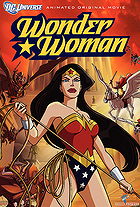 Posted : 14 years, 9 months ago on 12 September 2010 01:30
(A review of Wonder Woman)
Posted : 14 years, 9 months ago on 12 September 2010 01:30
(A review of Wonder Woman)Wonder Woman is quite possibly the best of the direct-to-DVD animated features from producer Bruce Timm. Not only does it cover the origin of DC’s second most powerful superhero (only Superman surpasses her in sheer might), but it finds the correct balance between action set pieces, romantic comedy and dramatic moments. This is a most deserving film for the premiere female comic book character.
The opening sequence presents the most intense battle in the entirety of the DC animated series, both in these stand-alone features and the beloved DCAU. The war between Ares, voiced to deliciously evil perfection by Alfred Molina, and Queen Hippolyta, voiced by Virginia Madsen as a tough female solider, rages intensely. Hippolyta fell in love with the wrathful god, produced a son against her will and sought revenge. Zeus interferes and prevents her from killing him (this is a plot point that continues to annoy me throughout the film – how does one kill a god?), but Hera gives her the tools to imprison him. The Amazons are given their own island, eternal youth, strength and beauty and protect from the world of man. It is here that Hippolyta molds Diana out of sand and gives her life with her blood. A gift from the goddess that have taken favor with the Amazons, Diana is blessed with intelligence, strength, beauty, the ability to fly, etc. When Steve Trevor lands on Themyscira, a contest is held to see who is the strongest, smartest and bravest of the Amazons. The winner shall be both ambassador to man’s world, and the person who takes Steve Trevor back home. Going behind her mother’s back, Princess Diana wins the contest and is given the items and costume we have come to know as the ‘Wonder Woman’ look.
A vast majority of the film finds Diana and Steve engaging in a battle of the sexes, and Diana trying to comprehend post-feminist theories and ideas. Keri Russell, of whom I was apprehensive of as the title character, nails it. Being capable of projecting both a strength and a femininity that makes Wonder Woman so interesting as a character. And Nathan Fillion is perfectly cast as Steve Trevor. They generate sparks and romantic tension despite only being cartoon characters.
Unlike Superman: Doomsday which couldn’t rise above its script imperfections, Wonder Woman has a few plot inconsistencies but the fantastic vocal work and animation make them easy to look past. The most egregious of these inconsistencies is the notion that a god, who is immortal, could be killed. But somehow, inexplicably really, Diana is capable of decapitating Ares during the final battle. But with so much to recommend a few minor flaws are easily bypassed.
The opening sequence presents the most intense battle in the entirety of the DC animated series, both in these stand-alone features and the beloved DCAU. The war between Ares, voiced to deliciously evil perfection by Alfred Molina, and Queen Hippolyta, voiced by Virginia Madsen as a tough female solider, rages intensely. Hippolyta fell in love with the wrathful god, produced a son against her will and sought revenge. Zeus interferes and prevents her from killing him (this is a plot point that continues to annoy me throughout the film – how does one kill a god?), but Hera gives her the tools to imprison him. The Amazons are given their own island, eternal youth, strength and beauty and protect from the world of man. It is here that Hippolyta molds Diana out of sand and gives her life with her blood. A gift from the goddess that have taken favor with the Amazons, Diana is blessed with intelligence, strength, beauty, the ability to fly, etc. When Steve Trevor lands on Themyscira, a contest is held to see who is the strongest, smartest and bravest of the Amazons. The winner shall be both ambassador to man’s world, and the person who takes Steve Trevor back home. Going behind her mother’s back, Princess Diana wins the contest and is given the items and costume we have come to know as the ‘Wonder Woman’ look.
A vast majority of the film finds Diana and Steve engaging in a battle of the sexes, and Diana trying to comprehend post-feminist theories and ideas. Keri Russell, of whom I was apprehensive of as the title character, nails it. Being capable of projecting both a strength and a femininity that makes Wonder Woman so interesting as a character. And Nathan Fillion is perfectly cast as Steve Trevor. They generate sparks and romantic tension despite only being cartoon characters.
Unlike Superman: Doomsday which couldn’t rise above its script imperfections, Wonder Woman has a few plot inconsistencies but the fantastic vocal work and animation make them easy to look past. The most egregious of these inconsistencies is the notion that a god, who is immortal, could be killed. But somehow, inexplicably really, Diana is capable of decapitating Ares during the final battle. But with so much to recommend a few minor flaws are easily bypassed.
 0 comments, Reply to this entry
0 comments, Reply to this entry
 Login
Login
 Home
Home 95 Lists
95 Lists 1531 Reviews
1531 Reviews Collections
Collections